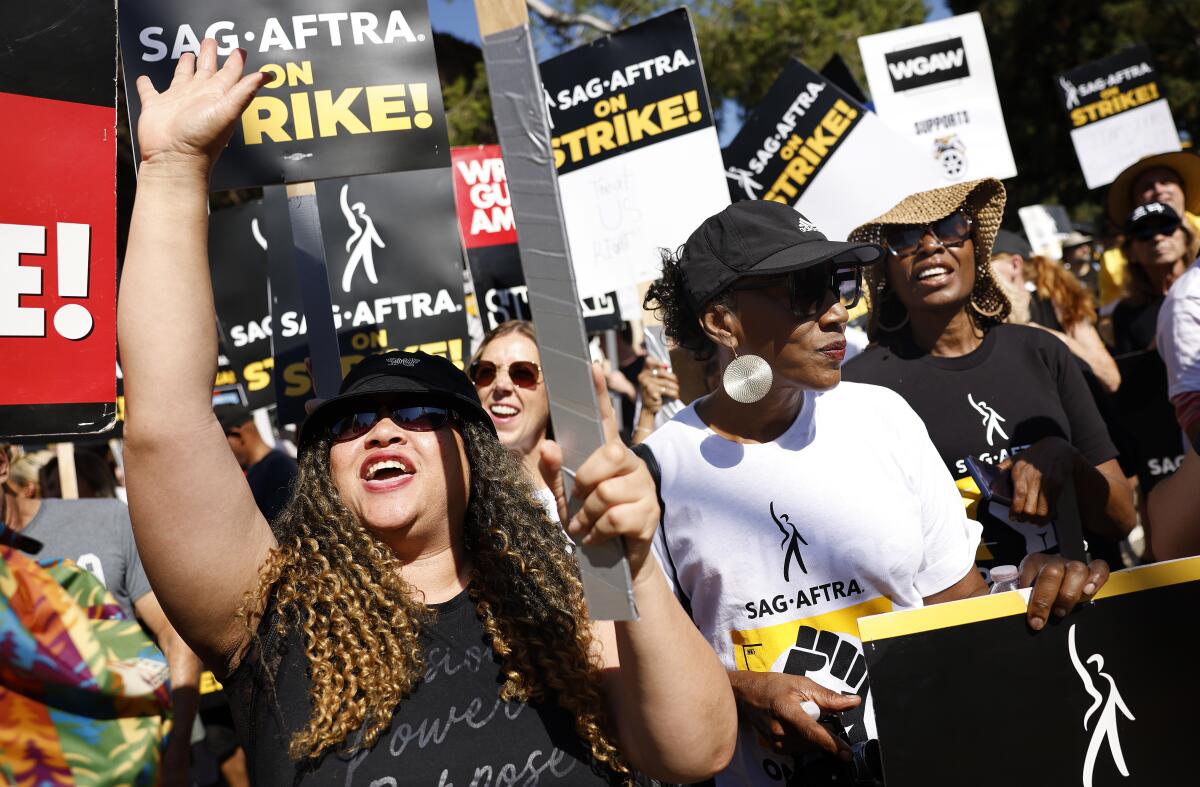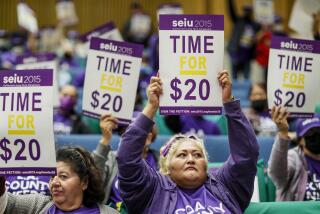WGA, SAG-AFTRA leaders call for striking workers to get unemployment insurance

- Share via
Members of the SAG-AFTRA actors’ guild and the Writers Guild of America came together Thursday morning for a protest outside Amazon Studios in Culver City. But their real target was hundreds of miles away at the California statehouse in Sacramento.
“We’re fighting for the very soul of our industry; this is an existential crisis,” SAG-AFTRA Secretary-Treasurer Joely Fisher said from atop a podium sporting a sign that read, “Unemployment Benefits for Striking Workers.” “Today we are rallying for a critical piece of legislation.”
That measure, and the focus of the event, was Senate Bill 799, which if it were to become law would allow striking workers to collect unemployment benefits after they’ve been on strike for two weeks. Labor unions back the bill, but it’s facing stiff opposition from business groups, which say companies would end up paying higher taxes. The California Chamber of Commerce has dubbed the bill a job-killer.
“Being unemployed is fundamentally different than being on strike,” the Chamber’s policy advocate Robert Moutrie said in a statement last month. “SB 799 fundamentally alters the nature of [unemployment insurance] by providing unemployment benefits to workers who still have a job and have chosen to temporarily refuse to work as a negotiating tactic.”
The Alliance of Motion Picture and Television Producers, which represents Hollywood’s major studios in their negotiations with both guilds, declined to comment on the bill. Members of the WGA have been on strike since early May, and SAG-AFTRA members walked out in mid-July.
The Times counted at least 100 attendees at the joint writers-actors event, with many wielding black-and-red WGA picket signs or black-and-yellow SAG-AFTRA ones. A volunteer distributed additional signs focused specifically on expanding unemployment benefits.
“When you lose your job or get laid off, you can apply for unemployment benefits,” said WGA West President Meredith Stiehm. “People on strike can’t do that in California. … It’s something that would’ve helped us if we had it in place before now.”
Workers often rely on various options for paying their bills while on strike, including personal savings, side hustles and strike funds, though programs such as the SAG-AFTRA Foundation’s emergency assistance program call for applicants to have urgent financial need.
Among Thursday’s other speakers were representatives from the Service Employees International Union, which organizes workers in healthcare and other industries, and the International Alliance of Theatrical Stage Employees, an entertainment industry union made up of below-the-line crew members. Both said they stood in solidarity with SAG-AFTRA and the WGA.
“For the first time since I can remember, workers are recognizing the dignity of another’s work and how someone else’s labor brings value to their lives,” said Los Angeles County Federation of Labor President Yvonne Wheeler, another featured speaker. The approximately 800,000 members of the “Fed,” as Wheeler’s labor group is known, are “standing with you, and we’ve got your back.”
Businesses pay state and federal payroll taxes on each employee’s first $7,000 in annual wages to fund the unemployment insurance program. But those tax dollars haven’t been enough to fund unemployment benefits, which total as much as $450 per week for a maximum of 26 weeks for Californians.
The state also borrowed $20 billion from the federal government in 2020 to fund unemployment claims. To repay that loan, employers would pay additional taxes.
“It’s time for California to catch up” to New York and New Jersey, WGA spokesman Bob Hopkinson said in an email. Those states allow certain workers on strike to collect unemployment benefits. Other states are also looking at the idea, although striking union members in most states don’t qualify for unemployment benefits.
California introduced a bill in 2019 to allow striking workers to collect unemployment pay, but it failed in the Senate.
Writers and actors aren’t the only ones who stand to gain from the legislation. Workers across the Southland have gone on strike in recent months, including public school workers, hotel employees and nurses.
Senate Bill 799, written by Sen. Anthony Portantino (D-Burbank), recently cleared the Assembly Committee on Insurance — with WGA and SAG-AFTRA leaders present at the panel’s hearing — and on Thursday, the Assembly Appropriations Committee moved the legislation forward after holding a hearing of its own. A WGA representative testified at that hearing too.
The cost to the state’s unemployment insurance fund is “likely in the low millions to tens of millions of dollars,” but it is “difficult to predict” because it depends on factors including how long strikes last, according to the appropriations committee’s bill analysis.
The full Assembly hasn’t yet voted on the measure, which also needs approval from the Senate. State legislators have to pass it and all other proposed bills by next Thursday, the final day of the 2023 legislative session.
More to Read
Inside the business of entertainment
The Wide Shot brings you news, analysis and insights on everything from streaming wars to production — and what it all means for the future.
You may occasionally receive promotional content from the Los Angeles Times.











